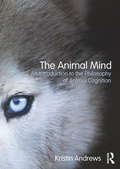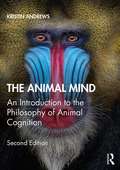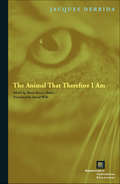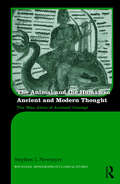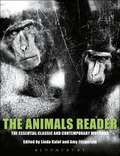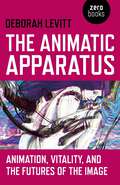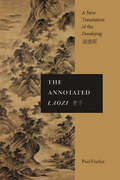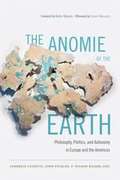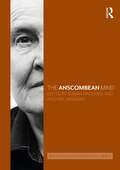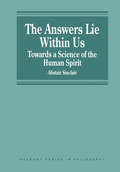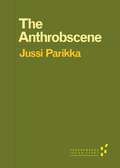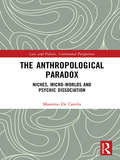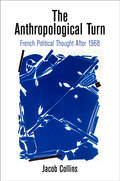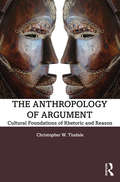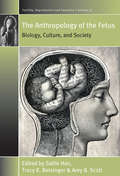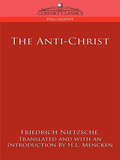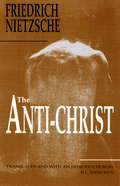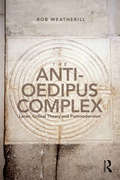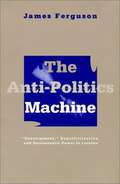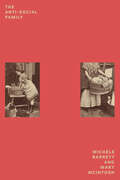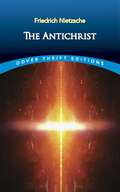- Table View
- List View
The Animal Mind: An Introduction to the Philosophy of Animal Cognition
by Kristin AndrewsThe study of animal cognition raises profound questions about the minds of animals and philosophy of mind itself. Aristotle argued that humans are the only animal to laugh, but in recent experiments rats have also been shown to laugh. In other experiments, dogs have been shown to respond appropriately to over two hundred words in human language. In this introduction to the philosophy of animal minds Kristin Andrews introduces and assesses the essential topics, problems and debates as they cut across animal cognition and philosophy of mind. She addresses the following key topics: what is cognition, and what is it to have a mind? What questions should we ask to determine whether behaviour has a cognitive basis? the science of animal minds explained: ethology, behaviourist psychology, and cognitive ethology rationality in animals animal consciousness: what does research into pain and the emotions reveal? What can empirical evidence about animal behaviour tell us about philosophical theories of consciousness? does animal cognition involve belief and concepts; do animals have a ‘Language of Thought’? animal communication other minds: do animals attribute ‘mindedness’ to other creatures? moral reasoning and ethical behaviour in animals animal cognition and memory. Extensive use of empirical examples and case studies is made throughout the book. These include Cheney and Seyfarth’s ververt monkey research, Thorndike’s cat puzzle boxes, Jensen’s research into humans and chimpanzees and the ultimatum game, Pankseep and Burgdorf’s research on rat laughter, and Clayton and Emery’s research on memory in scrub-jays. Additional features such as chapter summaries, annotated further reading and a glossary make this an indispensable introduction to those teaching philosophy of mind, animal cognition. It will also be an excellent resource for those in fields such as ethology, biology and psychology.
The Animal Mind: An Introduction to the Philosophy of Animal Cognition
by Kristin AndrewsThe philosophy of animal minds addresses profound questions about the nature of mind and the relationships between humans and other animals. In this fully revised and updated introductory text, Kristin Andrews introduces and assesses the essential topics, problems, and debates as they cut across animal cognition and philosophy of mind, citing historical and cutting-edge empirical data and case studies throughout. The second edition includes a new chapter on animal culture. There are also new sections on the evolution of consciousness and tool use in animals, as well as substantially revised sections on mental representation, belief, communication, theory of mind, animal ethics, and moral psychology. Further features such as chapter summaries, annotated further reading, and a glossary make The Animal Mind an indispensable introduction to those teaching philosophy of mind, philosophy of animal minds or animal cognition. It will also be an excellent resource for those in fields such as ethology, biology, and psychology.
The Animal Rights Debate: Abolition or Regulation? (Critical Perspectives on Animals: Theory, Culture, Science, and Law)
by Robert Garner Gary FrancioneGary L. Francione is a law professor and leading philosopher of animal rights theory. Robert Garner is a political theorist specializing in the philosophy and politics of animal protection. Francione maintains that we have no moral justification for using nonhumans and argues that because animals are property-or economic commodities-laws or industry practices requiring "humane" treatment will, as a general matter, fail to provide any meaningful level of protection. <P><P> Garner favors a version of animal rights that focuses on eliminating animal suffering and adopts a protectionist approach, maintaining that although the traditional animal-welfare ethic is philosophically flawed, it can contribute strategically to the achievement of animal-rights ends. As they spar, Francione and Garner deconstruct the animal protection movement in the United States, the United Kingdom, Europe, and elsewhere, discussing the practices of such organizations as PETA, which joins with McDonald's and other animal users to "improve" the slaughter of animals. They also examine American and European laws and campaigns from both the rights and welfare perspectives, identifying weaknesses and strengths that give shape to future legislation and action.
The Animal That Therefore I Am (Perspectives in Continental Philosophy)
by Jacques Derrida David Wills Marie-Louise MalletThe Animal That Therefore I Am is the long-awaited translation of the complete text of Jacques Derrida’s ten-hour address to the 1997 Cérisy conference entitled “The Autobiographical Animal,” the third of four such colloquia on his work. The book was assembled posthumously on the basis of two published sections, one written and recorded session, and one informal recorded session. The book is at once an affectionate look back over the multiple roles played by animals in Derrida’s work and a profound philosophical investigation and critique of the relegation of animal life that takes place as a result of the distinction—dating from Descartes—between man as thinking animal and every other living species. That starts with the very fact of the line of separation drawn between the human and the millions of other species that are reduced to a single “the animal.” Derrida finds that distinction, or versions of it, surfacing in thinkers as far apart as Descartes, Kant, Heidegger, Lacan, and Levinas, and he dedicates extended analyses to the question in the work of each of them. The book’s autobiographical theme intersects with its philosophical analysis through the figures of looking and nakedness, staged in terms of Derrida’s experience when his cat follows him into the bathroom in the morning. In a classic deconstructive reversal, Derrida asks what this animal sees and thinks when it sees this naked man. Yet the experiences of nakedness and shame also lead all the way back into the mythologies of “man’s dominion over the beasts” and trace a history of how man has systematically displaced onto the animal his own failings or bêtises. The Animal That Therefore I Am is at times a militant plea and indictment regarding, especially, the modern industrialized treatment of animals. However, Derrida cannot subscribe to a simplistic version of animal rights that fails to follow through, in all its implications, the questions and definitions of “life” to which he returned in much of his later work.
The Animal and the Human in Ancient and Modern Thought: The ‘Man Alone of Animals’ Concept (Routledge Monographs in Classical Studies)
by Stephen T. NewmyerAncient Greeks endeavored to define the human being vis-à-vis other animal species by isolating capacities and endowments which they considered to be unique to humans. This approach toward defining the human being still appears with surprising frequency, in modern philosophical treatises, in modern animal behavioral studies, and in animal rights literature, to argue both for and against the position that human beings are special and unique because of one or another attribute or skill that they are believed to possess. Some of the claims of man’s unique endowments have in recent years become the subject of intensive investigation by cognitive ethologists carried out in non-laboratory contexts. The debate is as lively now as in classical times, and, what is of particular note, the examples and methods of argumentation used to prove one or another position on any issue relating to the unique status of human beings that one encounters in contemporary philosophical or ethological literature frequently recall ancient precedents. This is the first book-length study of the ‘man alone of animals’ topos in classical literature, not restricting its analysis to Greco-Roman claims of man’s intellectual uniqueness, but including classical assertions of man’s physiological and emotional uniqueness. It supplements this analysis of ancient manifestations with an examination of how the commonplace survives and has been restated, transformed, and extended in contemporary ethological literature and in the literature of the animal rights and animal welfare movements. Author Stephen T. Newmyer demonstrates that the anthropocentrism detected in Greek applications of the ‘man alone of animals’ topos is not only alive and well in many facets of the current debate on human-animal relations, but that combating its negative effects is a stated aim of some modern philosophers and activists.
The Animals Reader: The Essential Classic and Contemporary Writings
by Linda Kalof Amy FitzgeraldThe study of animals - and the relationship between humans and other animals - is now one of the most fiercely debated topics in contemporary science and culture. Animals have a long history in human society, providing food, labour, sport and companionship as well as becoming objects for exhibit. More contemporary uses extend to animals as therapy and in scientific testing. As natural habitats continue to be destroyed, the rights of animals to co-exist on the planet - and their symbolic power as a connection between humans and the natural world - are ever more hotly contested. The Animals Reader brings together the key classic and contemporary writings from Philosophy, Ethics, Sociology, Cultural Studies, Anthropology, Environmental Studies, History, Law and Science. As the first book of its kind, The Animals Reader provides a framework for understanding the current state of the multidisciplinary field of animal studies. This anthology will be invaluable for students across the Humanities and Social Sciences as well as for general readers.
The Animatic Apparatus: Animation, Vitality, and the Futures of the Image
by Deborah LevittUnprecedented kinds of experience, and new modes of life, are now produced by simulations, from the CGI of Hollywood blockbusters to animal cloning to increasingly sophisticated military training software, while animation has become an increasingly powerful pop-cultural form. Today, the extraordinary new practices and radical objects of simulation and animation are transforming our neoliberal-biopolitical &“culture of life&”. The Animatic Apparatus offers a genealogy for the animatic regime and imagines its alternative futures, countering the conservative-neoliberal notion of life&’s sacred inviolability with a new concept and ethics of animatic life.
The Annotated Laozi: A New Translation of the Daodejing (SUNY series in Chinese Philosophy and Culture)
by Paul FischerWritten more than two thousand years ago, the Laozi, or Daodejing, is a classic of Chinese intellectual history and has been of foundational importance to cultural and religious history throughout East Asia. It is now venerated as a masterpiece of self-cultivation, with a poetic narrative that remains accessible and relevant even today. Paul Fischer's new, annotated translation aims for fidelity to the original text as well as clarity for a modern audience. Fischer's notes and explanations bring out obscure meanings in ancient Chinese wording and rhetoric, elucidate the connections among the eighty-one short chapters, and clarify the coherence of the work as a whole. Carefully considering the various manuscripts that have been archaeologically uncovered in recent decades, as well as the variations among received versions of the Laozi, Fischer's translation discloses the beauty and meaning of the original. This book will benefit students and readers interested in intellectual history as well as those who want to explore what the text has to say about the meaning of life.
The Anomie of the Earth: Philosophy, Politics, and Autonomy in Europe and the Americas
by Wilson Kaiser Federico Luisetti John PicklesThe contributors to The Anomie of the Earth explore the convergences and resonances between Autonomist Marxism and decolonial thinking. In discussing and rejecting Carl Schmitt's formulation of the nomos--a conceptualization of world order based on the Western tenets of law and property--the authors question the assumption of universal political subjects and look towards politics of the commons divorced from European notions of sovereignty. They contrast European Autonomism with North and South American decolonial and indigenous conceptions of autonomy, discuss the legacies of each, and examine social movements in the Americas and Europe. Beyond orthodox Marxism, their transatlantic exchanges point to the emerging categories disclosed by the collapse of the colonial and capitalist frameworks of Western modernity. Contributors. Joost de Bloois, Jodi A. Byrd, Gustavo Esteva, Silvia Federici, Wilson Kaiser, Mara Kaufman, Frans-Willem Korsten, Federico Luisetti, Sandro Mezzadra, Walter D. Mignolo, Benjamin Noys, John Pickles, Alvaro Reyes, Catherine Walsh, Gareth Williams, Zac Zimmer
The Anscombean Mind (Routledge Philosophical Minds)
by Adrian HaddockG. E. M. Anscombe (1919–2001) is one of the most important philosophers of the twentieth century. Known primarily for influencing research in action theory and moral philosophy, her work also has relevance in the study of metaphysics, philosophy of language, philosophy of mind, philosophy of religion, and politics. The Anscombean Mind provides a comprehensive survey of Anscombe’s thought, not only placing it in its historical context but also exploring its enduring significance in contemporary debates. Divided into three clear parts, twenty-three chapters by an international array of contributors address the following themes: ancient philosophy metaphysics mind and language Wittgenstein action and ethics politics religion and faith. The Anscombean Mind is an indispensable resource for anyone studying and researching action theory, ethics, moral philosophy, Wittgenstein, twentieth-century philosophy, and Anscombe herself.
The Answers Lie Within Us: Towards a Science of the Human Spirit (Avebury Series in Philosophy)
by Alistair SinclairThis book suggests that religion, in its usual sense, can be replaced by something better, that the human spirit or subjectivity can be the subject of scientific study and that lack of purpose or design in the universe is not a handicap but a positive opportunity for intelligent beings to make of the universe and its contents what they reasonably can. The book breaks new ground in suggesting a radical alternative to religion. It offers a scientific and humanist alternative to religion which appeals to people’s critical faculties rather than emotions or intuitions. It also challenges current views of causation and the principle of sufficient reason by stressing the subjectivity of our reasoning powers and clarifying these in relation to an independent external reality. It develops and elaborates a notion of the ’noosphere’ within a theoretical system, this enables the notion to assume a scientific importance which it currently lacks because it is treated as an isolated, eccentric and rather mystical idea.
The Anthrax Letters: A Bioterrorism Expert Investigates the Attack That Shocked America
by Leonard A. ColeAt 2:00am on October 2, 2001, Robert Stevens entered a hospital emergency room. Feverish, nauseated, and barely conscious, no one knew what was making him sick. Three days later he was dead. Stevens was the first fatal victim of bioterrorism in America. Bioterrorism expert Leonard Cole has written the definitive account of the Anthrax attacks. Cole is the only person outside law enforcement to have interviewed every one of the surviving inhalation-anthrax victims, along with the relatives, friends, and associates of those who died, as well as the public health officials, scientists, researchers, hospital workers, and treating physicians. Fast paced and riveting, this minute-by-minute chronicle of the anthrax attacks recounts more than a history of recent current events, it uncovers the untold and perhaps even more important story of how scientists, doctors, and researchers perform life-saving work under intense pressure and public scrutiny. Updated with new information about Ivins and a series of upcoming Congressional hearings into the FBI's conduct in this case, The Anthrax Letters amply demonstrates how vulnerable America was in 2001 and whether we are better prepared now for a bioterror attack.
The Anthrobscene (Forerunners: Ideas First)
by Jussi ParikkaSmartphones, laptops, tablets, and e-readers all at one time held the promise of a more environmentally healthy world not dependent on paper and deforestation. The result of our ubiquitous digital lives is, as we see in The Anthrobscene, actually quite the opposite: not ecological health but an environmental wasteland, where media never die. Jussi Parikka critiques corporate and human desires as a geophysical force, analyzing the material side of the earth as essential for the existence of media and introducing the notion of an alternative deep time in which media live on in the layer of toxic waste we will leave behind as our geological legacy. Forerunners: Ideas First is a thought-in-process series of breakthrough digital publications. Written between fresh ideas and finished books, Forerunners draws on scholarly work initiated in notable blogs, social media, conference plenaries, journal articles, and the synergy of academic exchange. This is gray literature publishing: where intense thinking, change, and speculation take place in scholarship.
The Anthropological Paradox: Niches, Micro-worlds and Psychic Dissociation (Law and Politics)
by Massimo De CarolisThis book addresses how the erosion of traditional forms of political association and legal regulation has given rise to a pluralism of "imperfect communities" constantly exposed to the risk of dissolution. These are niches and micro-worlds that are connected through precarious and ambivalent ties. Such a far-reaching transformation affects at one and the same time both our psychic and social identity. The book argues that this phenomenon is linked to the proliferation of new forms of psychic "disorder" – depression, personality disorder, dissociation – typical of hypermodern societies. However, while these can easily turn into genuine disorders, they can also open onto richer forms of identity, more complex than those of the past. Based on this analysis, the book’s main claim is that this dynamic epitomizes a general anthropological paradox – one that has always marked the human animal: humans are bound by their own biological constitution to fend off disorder by drawing the boundaries of artificial niches, and yet they are inclined to expose themselves to unlimited contingency so that they can find a truly suitable environment. Pursuing a novel understanding of the apparent collapse of traditional juridico-political settings, this book makes the case that the emergence of dissociations at several levels – individual, social, political, legal – does not stem from a lack of political imagination. Rather, it is a situation with which humans are inevitably confronted: a perennial tension between the limited and the unlimited, between the desire to take refuge and the desire to cross borders.
The Anthropological Turn: French Political Thought After 1968 (Intellectual History of the Modern Age)
by Jacob CollinsA close look at post-1968 French thinkers Régis Debray, Emmanuel Todd, Marcel Gauchet, and Alain de BenoistIn The Anthropological Turn, Jacob Collins traces the development of what he calls a tradition of "political anthropology" in France over the course of the 1970s. After the social revolution of the 1960s brought new attention to identities and groups that had previously been marginal in French society, the country entered a period of stagnation: the economy slowed, the political system deadlocked, and the ideologies of communism and Catholicism lost their appeal. In this time of political, cultural, and economic indeterminacy, political anthropology, as Collins defines it, offered social theorists grand narratives that could give greater definition to "the social" by anchoring its laws and histories in the deep and sometimes archaic past.Political anthropologists sought to answer the most basic of questions: what is politics and what constitutes a political community? Collins focuses on four influential, yet typically overlooked, French thinkers—Régis Debray, Emmanuel Todd, Marcel Gauchet, and Alain de Benoist —who, from Left to far Right, represent different political leanings in France. Through a close and comprehensive reading of their work, he explores how key issues of religion, identity, citizenship, and the state have been conceptualized and debated across a wide spectrum of opinion in contemporary France.Collins argues that the stakes have not changed since the 1970s and rival conceptions of the republic continue to vie for dominance. Political and cultural issues of the moment—the burkini, for example—become magnified and take on the character of an anthropological threat. In this respect, he shows how the anthropological turn, as it figures in the work of Debray, Todd, Gauchet, and Benoist, is a useful lens for viewing the political and social controversies that have shaped French history for the last forty years.
The Anthropology of Argument: Cultural Foundations of Rhetoric and Reason
by Christopher W. TindaleThis innovative text reinvigorates argumentation studies by exploring the experience of argument across cultures, introducing an anthropological perspective into the domains of rhetoric, communication, and philosophy. The Anthropology of Argument fills an important gap in contemporary argumentation theory by shifting the focus away from the purely propositional element of arguments and onto how they emerge from the experiences of peoples with diverse backgrounds, demonstrating how argumentation can be understood as a means of expression and a gathering place of ideas and styles. Confronting the limitations of the Western tradition of logic and searching out the argumentative roles of place, orality, myth, narrative, and audience, it examines the nature of multi-modal argumentation. Tindale analyzes the impacts of colonialism on the field and addresses both optimistic and cynical assessments of contextual differences. The results have implications for our understanding of contemporary argumentative discourse in areas marked by deep disagreement, like politics, law, and social policy. The book will interest scholars and upper-level students in communication, philosophy, argumentation theory, anthropology, rhetoric, linguistics, and cultural studies.
The Anthropology of Ignorance
by Casey High Ann H. Kelly Jonathan MairThe question of ignorance occupies a central place in anthropological theory and practice. This volume argues that the concept of ignorance has largely been pursued as the opposite of knowledge or even its obverse. Though they cover wide empirical ground - from clients of a fertility treatment center in New York to families grappling with suicide in Greenland - contributors share a commitment to understanding the concept as a productive, social practice. Ultimately, The Anthropology of Ignorance asks whether an academic commitment to knowledge can be squared with lived significance of ignorance and how taking it seriously might alter anthropological research practices.
The Anthropology of the Fetus: Biology, Culture, and Society (Fertility, Reproduction and Sexuality: Social and Cultural Perspectives #37)
by Sallie Han Tracy K. Betsinger Amy B. ScottAs a biological, cultural, and social entity, the human fetus is a multifaceted subject which calls for equally diverse perspectives to fully understand. Anthropology of the Fetus seeks to achieve this by bringing together specialists in biological anthropology, archaeology, and cultural anthropology. Contributors draw on research in prehistoric, historic, and contemporary sites in Europe, Asia, North Africa, and North America to explore the biological and cultural phenomenon of the fetus, raising methodological and theoretical concerns with the ultimate goal of developing a holistic anthropology of the fetus.
The Anti-Christ
by Friedrich Nietzsche"The Christian concept of a god-the god as the patron of the sick, the god as a spinner of cobwebs, the god as a spirit-is one of the most corrupt concepts that has ever been set up in the world... In him nothingness is deified, and the will to nothingness is made holy." See Sharp Press; Tuscon, AZ -from The Anti-Christ. He's one of the most debated thinkers of the 19th century: Nietzsche and his works have been by turns vilified, lauded, and subjected to numerous contradictory interpretations, and yet he remains a figure of profound import, and his works a necessary component of a well-rounded education. The Anti-Christ, first published in German in 1895, is absolutely vital to any meaningful understanding of Nietzsche the man and Nietzsche the philosopher. An insightful and entertaining indictment of Christianity, it has enraged and inspired generations of readers, and this 1920 translation, by H. L. Mencken, considered the best available, is almost as controversial as the work itself, highlighting the darkest side of Mencken's cynicism. Also available from Cosimo Classics: Nietzsche's The Use and Abuse of History.
The Anti-Christ
by H. L. Mencken Friedrich NietzscheThis is Nietzsche's last book and a fitting capstone to his career. It's succinct, biting, and encapsulates the criticisms of Christianity found in his other works. This edition contains an 8,000-word introduction by its translator, the famous iconoclastic writer H. L. Mencken.
The Anti-Christ, Ecce Homo, Twilight of the Idols: And Other Writings
by Friedrich NietzscheNietzsche's late works are brilliant and uncompromising, and stand as monuments to his lucidity, rigor, and style. This volume combines, for the first time in English, five of these works: The Antichrist, Ecce Homo, Twilight of the Idols, Nietzsche contra Wagner, and The Case of Wagner. Nietzsche takes on some of his greatest adversaries in these works: traditional religion, contemporary culture, and above all, his one-time hero, Richard Wagner. His writing is simultaneously critical and creative, revealing his alternative philosophical vision, which, after more than a hundred years, still retains its audacious originality.
The Anti-Oedipus Complex: Lacan, Postmodernism and Philosophy
by Rob WeatherillThe Anti-Oedipus Complex critically explores the post ‘68 dramatic developments in Freudo-Lacanian psychoanalysis and cultural theory. Beginning with the decline of patriarchy and the master, exemplified by Freud’s paean for the Father, the revolutionary path was blown wide open by anti-psychiatry, schizoanalysis and radical politics, the complex antimonies of which are traced here in detail with the help of philosophers, such as Nietzsche, Baudrillard, Levinas, Steiner, Žižek, Badiou, Derrida and Girard, as well as theologians, analysts, writers, musicians and film makers. ? In this book, Rob Weatherill, starting from the clinic, considers the end of hierarchies, the loss of the Other, new subjectivities, so-called ‘creative destruction’, the power of negative thinking, revolutionary action, divine violence and new forms of extreme control. The book raises the following questions: Does the engagement of the Radical Orthodoxy movement offer some hope? Or should we re-situate psychoanalysis within a ‘genealogy of responsibility’ (Pato?ka / Derrida) as it emerges out of the sacred demonic, via Plato and Christianity? The Anti-Oedipus Complex will be of interest to psychoanalysts, psychotherapists, counsellors, social workers and scholars in critical theory, philosophy, cultural theory, literary theory and theology.
The Anti-Politics Machine: Development, Depoliticization, And Bureaucratic Power In Lesotho
by James FergusonA case study of development in the Thaba-Tseka district of Lesotho during the period 1975 to 1984, which looks at the workings of the development industry in the country, and in particular at one development project.
The Anti-Social Family (Radical Thinkers)
by Michèle Barrett Mary McIntoshDespite much talk of its decline, the nuclear family persists as a structure central to contemporary society, a fact to be lamented, according to the ideas of Michèle Barrett and Mary McIntosh. The Anti-social Family dissects the network of household, kinship and sexual relations that constitute the family form in advanced capitalist societies to show how they reinforce conditions of inequality. This classic work explores the personal and social needs that the family promises to meet but more often denies, and proposes moral and political practices for more egalitarian caring alternatives.
The Antichrist: In English Translation (Dover Thrift Editions)
by Friedrich Nietzsche"In truth there was only one Christian, and he died on the cross," declares Friedrich Nietzsche in this famous attack on Christianity and organized religion. A deep exploration and repudiation of Christian symbolism and morality, The Antichrist was the last of Nietzsche's works save for his autobiography, Ecco Homo. As such, it may be regarded as a final statement of some of his most important ideas. This polemic is also one of the philosopher's most conventionally formatted books, consisting of a connected argument with few digressions and a clearly defined beginning, middle, and end. Indeed, it ranks among philosophy's most accessible and easily understood works, consisting of 62 brief chapters. Each chapter features an aphorism that advances the author's arguments against Christian tenets. Fast-paced, concise, and brimming with conviction, Nietzsche's landmark work is essential to a grasp of his complete oeuvre.
